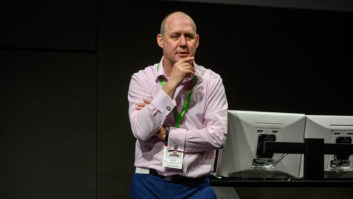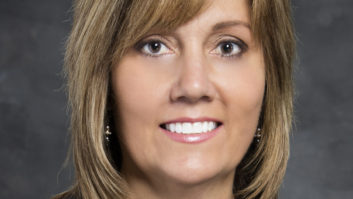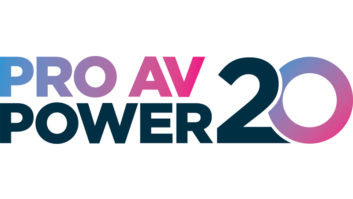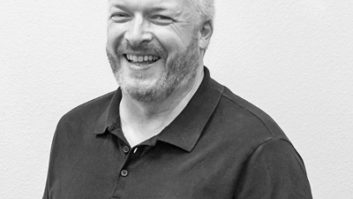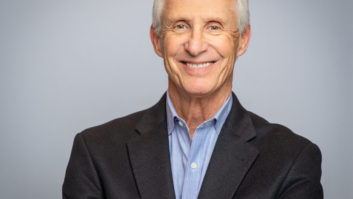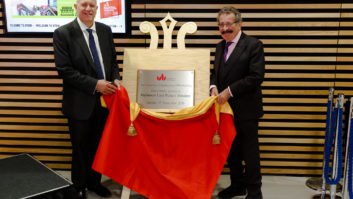#2: Christine Schyvinck, chairman, president, and CEO, Shure
How did you first get involved in the AV marketplace?
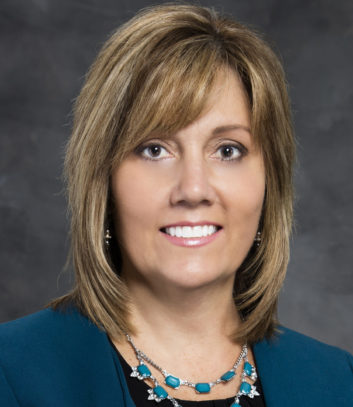 As the ‘A’ in AV stands for audio, I first got involved on day one of my career at Shure, which began 31 years ago. Of course, the scope of and technologies utilised in AV production has transformed significantly during that time, but the audio input to any AV system is still the transducer technology, which has been a competency of focus for Shure since the 1930s.
As the ‘A’ in AV stands for audio, I first got involved on day one of my career at Shure, which began 31 years ago. Of course, the scope of and technologies utilised in AV production has transformed significantly during that time, but the audio input to any AV system is still the transducer technology, which has been a competency of focus for Shure since the 1930s.
What would you say are the most significant changes/developments to have taken place in the industry during your time?
Two transformative developments come to mind: first the ascendance of software-based controls for AV systems; and second the integration of AV with IT. These developments have impacted the industry as a whole and Shure specifically, with respect to our hiring and development of engineering talent to create state-of-the-art products and to our marketing and support strategy to a new audience of end users.
What personal and professional achievements are you most proud of?
From a professional standpoint, I’m very proud of the part I’ve played in growing Shure’s global footprint. This started with a manufacturing-centric view earlier in my career when we had to globalise our supply chain and make it more cost-competitive. The side benefit of setting up global operations was travelling outside the US and seeing Shure products all around the world; how they were used, where they were sold, and who was using them.
This prepared me for later in my career when I was involved with globalising our sales and support. One size doesn’t always fit all, and it’s important to have local ‘feet on the street’ to provide the pulse of market trends, and to have local support available to our customers. This is why we set up experience centres like the one in London.
I am most proud of the globalisation because I see it as a continuation of efforts started by our company founder, S.N. Shure, many decades before. He was ahead of his time and was distributing Shure products outside of the US as early as the 1930s.
Do you have a philosophy that you live by professionally? If so, what is it and how has it benefitted you personally and those you’ve worked with?
I believe it is essential to have an authentic connection with the end users of your products – to understand their business models, workflows, and most importantly, the challenges that they face on a daily basis.
Early in my career, as a quality engineer, I was taught to be guided by the ‘Voice of the Customer’ – that was the mantra of that era. As I grew in my career, and as management philosophies evolved, I realised that simply asking and listening to the voice wasn’t enough. People don’t know what they don’t know. If you can work shoulder-to-shoulder with end users, you gain empathy and understanding of the problems they are trying to solve. You then hold that up against the technology you’re developing and devise breakthrough solutions.
Using this form of ethnographic research advances technology more quickly than simply offering up product enhancements or modifications.
Prior to the outbreak of the global pandemic, what would you say were the biggest areas of technological or operational challenge for the AV industry?
Operationally, demand planning can be a tricky exercise. Unlike some areas of Shure’s business that follow a fairly predictable seasonality trend, the project-based ordering patterns of many AV customers do not adhere to annual repetition. Additionally, we know that integrators want products to arrive when they are ready to install them – not earlier, and certainly not later. Balancing inventory levels with just-in-time delivery for customers requires diligence and constant communication with both suppliers and the channel.
What impact has the pandemic had on you and your business, and what do you think will be the longer term impact of this extraordinary period on our sector?
As with most CEOs, the pandemic has forced an introspective look at one’s ability to be flexible, both personally and as an organisation. Business impacts aside, the situation has stress-tested every function at our company, and I’m proud to say that we have shown great strength across the board. The longer term impact for the AV sector, to me, is quite clear. Remote collaboration is now fully entrenched as the new normal. This will guide manufacturers’ product and technology strategies – some of which the industry was already pursuing – and in many cases accelerate them.
What needs to change in the industry? What do we as a community need to get better at?
We don’t need to change anything in the industry, per se, but at Shure we do see an ongoing opportunity to improve the level of training and education through the entire value chain. The AV/IT merge I mentioned earlier has uncovered gaps in the fluency with which each side speaks the other’s language. This requires integrators and IT professionals to get out of their comfort zones and invest in training in order to achieve a better collaborative result. The manufacturers have a role in this as well – they must be fully bilingual!
In your opinion, what will be the biggest driver(s) of change for the AV market in the next five years?
Of course, this question may have had a different answer just a few months ago, but we must now view future change in light of what could be a protracted recovery of business in general globally. There will inevitably be fallout from the pandemic, both in the survival of players in the industry and the corporate customers they serve. Those who persevere on both the supply and demand side will be rethinking their investment strategies. This will lead to a sharp focus on the products and services the supply side provides and the capital investment choices the demand side makes.
Finally, what would be your message to those starting out their careers in the AV community?
Welcome to a dynamic and ever-evolving industry. Never stop learning. And remember that your primary mission is to facilitate and enhance human connection. This is done by deploying the most powerful technologies, but these should never get in the way of the end user experience.
Quickfire round
Who’s had the greatest influence on your career?
I had two mentors that helped to shape my career: one was a professor in my undergrad programme who encouraged me to get into the field of ‘quality’. The second was an executive in the quality field who helped me find a suitable grad programme when I wanted to break into management.
Who did/do you look up to as a role model professionally?
Yet another mentor I had was Mrs Shure. When her husband and company founder (S.N. Shure) passed away, she was in her 70s and had many options in front of her. The one she chose had her at the helm of the company for over two decades. I greatly admired her determination to keep the company healthy and growing, while at the same time leading with compassion. She knew how to strike that balance and I try to carry that forward today.
How do you measure success?
In one word: trust. This is the ultimate goal in my personal and professional relationships. If people can trust your word, trust what you’re selling, and trust that you’ll do the right thing, success will quickly follow.
What’s your biggest professional regret?
I honestly don’t have one. The only curiosity I sometimes play out in my mind is wondering where I’d be today if I’d stuck with my original plan to become a pilot when I entered college.
If you were a teenager today, what profession would you go into?
I’d pursue a technical path – either in engineering like I did 35 years ago, or in more of a computer science field. I like puzzles, brainteasers, etc, so the elements of coding were always fun to me. A profession in technology can take you down a million different paths.
